SIRiPods Program Sets Undergraduates Up for Research Success

The new Samueli Interdisciplinary Research (SIRiPods) program is a four-week summer pilot program with three main goals: introduce rising third-year undergraduates to the practice of research as a pathway to academic and professional careers, diversify the student population and encourage graduate study at UCI. Shown (from left): back row: Dustin Luong, Santino Miguel Feranil, two students (names unknown), James Hort, Jiazhe “Loki” Chen; middle row: Leyla Riley (with Atticus), Christine King, Robin Perry Jeffers, Brett Sanders; front row: Allen Dineros, Christopher Olivares Martinez, Renzo Calilung, Joanne Ly.
Sept. 17, 2021 – The answers may be blowing in the wind, as Bob Dylan famously sings. But at the new Samueli Interdisciplinary Research in Pods (SIRiPods) program, the answers are swirling in waterways and wildfires, embedded in virtual reality experiences, and reimagined in sustainable energy systems. Most importantly, new answers are forming in the minds of eager undergraduates as they spend the summer learning to address some of our most pressing problems.
SIRiPods is the dream of Brett Sanders, professor of civil and environmental engineering. Even after teaching at UCI for 24 years, Sanders still dares to think big and bold. When Sanders was interim associate dean of student affairs this past year, it became clear that there wasn’t a natural starting point for undergraduate research. He wanted to change that and received strong support from colleagues like Robin Perry Jeffers, director of undergraduate student affairs, and Leyla Riley, director of academic innovation and partnerships, who helped administer the program.
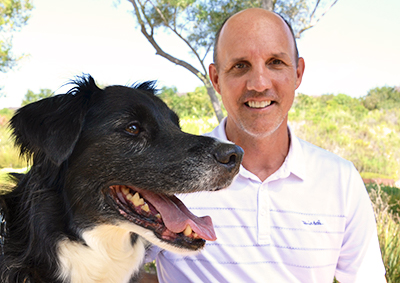
Brett Sanders, professor of civil and environmental engineering, created the Samueli Interdisciplinary Research (SIRiPods) to help build an ecosystem of research to benefit everyone, but especially first-generation college students like he was. His dog, Shadow, often appeared during class sessions and became the program’s mascot.
Sanders kicked off the first SIRiPods session by playing Dylan’s music, explaining that the folk-rock singer-songwriter was not only a musician, artist and Nobel Prize winner. “I think he’s someone who is a researcher,” argues Sanders. “He reads, studies different types of music, is always changing, always pushing things, never happy with the status quo.” Dylan’s impact on social justice awareness especially moved Sanders, as he reconnected to Dylan’s music during the COVID-19 pandemic and Black Lives Matter protests. With SIRiPods, Sanders hopes to inspire students to think beyond the known and be curious like Dylan as they explore how to help humanity in their unique way.
The ambitious four-week summer pilot program has three main goals: introduce rising third-year undergraduates to the practice of research as a pathway to academic and professional careers, diversify the student population and encourage graduate study at UCI. SIRiPods is a mix of seminars, panel discussions, training sessions, individual meetings and study/work time, culminating in a research project proposal and presentation.
SIRiPods’ inaugural class drew 72 applicants; 45 enrolled and 32 completed the course. The program was offered free of charge with the option to earn two credits/units for the course as a bonus.
Three core faculty members, Christine King, Christopher Olivares Martinez and Erdem Sasmaz, led students through three different pods focused on Medical Innovation and Virtual Reality, Controlling Exposure to Wildfire Contaminants, and Sustainable Energy and Fuels, respectively.
“Unlike just about any other summer program, we have really aligned our activities with our school’s priorities, and with natural interdisciplinary partners on campus,” explains Sanders. “The interdisciplinary approach is most important for bringing in different perspectives around the same problem.”
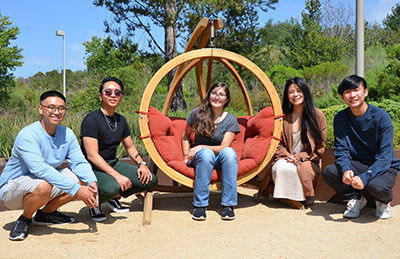
“Because biomedical engineering is so diverse, I have to make it almost individualistic to make sure it’s open for the students to be able to explore their own interests,” says Christine King, assistant professor of teaching in biomedical engineering (center), with a few Pod 1 participants focusing on medical innovation and virtual reality (from left): Renzo Calilung, Santino Miguel Feranil, graduate student Joanne Ly, and Dustin Luong.
To help foster collaboration across disciplines, 21 faculty members, nine graduate and postdoctoral students, and two main staff members worked together to create the unique experience.
“I really like that SIRiPods focused on multidisciplinary research, which meant we could bring in a lot of different perspectives that students may not have thought about,” explains King, assistant professor of teaching in biomedical engineering. “I think engineers need to be with human-centered people, including colleagues in humanities, medicine, public health and business as direct influences.” King attended her colleagues’ seminars, sharing the students’ enthusiasm for learning: “I really geek out.”
Olivares Martinez, assistant professor of civil and environmental engineering, adds, “I think an interdisciplinary approach gives students a 'big picture' perspective on a project, and it lets them harness all of their skill sets and lived experiences to solve a problem.”
SIRiPods also empowered students to take control of their own research interests. “Normally, students are immersed in a project that someone else designed,” explains Sanders. “This program allows students to take control over the research that they’re doing. They’re setting the agenda.”
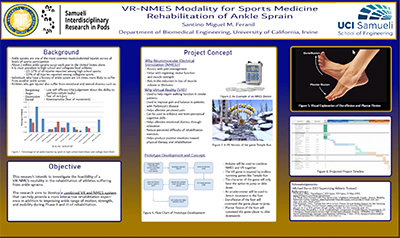
Santino Miguel Feranil, biomedical engineering student, presented his research project on neuromuscular electro-stimulation and virtual reality for sports medicine or rehabilitation.
Students created research projects ranging from understanding Alzheimer’s disease and measuring firefighting substances in water to developing sustainable energy sources. Santino Miguel Feranil, biomedical engineering student in Pod 1 with King, is passionate about sports medicine: “I’m focusing on building a modality that is neuromuscular electro-stimulation and virtual reality for sports medicine or rehabilitation – specifically on limb injuries.”
However, the COVID-19 pandemic posed some difficulties. “Being remote and trying to build a community is one of the biggest challenges,” says King. “We try and use a lot of newer technologies like Discord (a voice, video and text messaging app).” Program leaders also incorporated social activities like a step contest, game nights, a virtual poster session and even an in-person luncheon held safely outside.
“My favorite part is the whole vibe, that everyone is very friendly and chill. We just love to talk with each other,” says Jiazhe “Loki” Chen, chemical engineering undergrad in Pod 3 with Sasmaz. He says he wasn’t thinking about graduate school when he started the program, but now he’s seriously considering it. “SIRiPods has been very rewarding, and I believe it will definitely help me in the future.”
Yet, working remotely allowed professors to expand their teaching approach. Olivares Martinez says that besides the typical lecture style, “Our pod faculty focused on diversity of speakers, and the remote format allowed us to include non-UCI guests like filmmaker and ecologist John Liu and Professor Johann Osma, who taught students about bionanotechnology from Colombia. We also had simulations: a role-playing exercise on a city budget plan meeting and technical workshops, like a Geographic Information Systems (GIS) session by Veronica Vieira, public health professor, and How to Give Effective Presentations by Diego Rosso, civil and environmental engineering professor.”
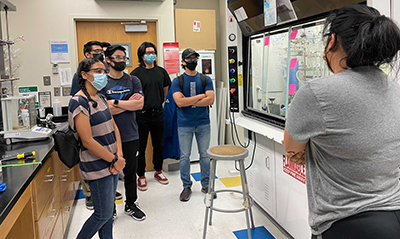
SIRiPods students in Pod 3 led by Erdem Sasmaz, assistant professor of chemical and biomolecular engineering, visit Chemistry Professor Jenny Yang's lab. Photo by Erdem Sasmaz.
Sanders says, “It was designed to have benefits for everyone – faculty, grad students, postdocs and undergraduates. We’re trying to create this ecosystem of research and professional networking. Graduate students can mentor students and give them advice. At the same time, those same grad students are being mentored by faculty.”
Joanne Ly, biomedical engineering doctoral candidate in Pod 1, experienced exactly that. “I have always enjoyed watching and seeing students have that glimmer in their eyes when they realize this is why I’m doing what I’m doing,” she says. “Just working with students and getting to know them, having those one-on-ones and understanding where they’re coming from has always been the highlight for me.”
Ly also says she benefited from the program’s faculty mentors. “Definitely as a grad student, you have the opportunity to see the other professors whom you connect with because of the way we’ve organized and structured our specific pod. You have access to these professors and physicians in the same way that the undergrads do.”
Those efforts to create community and break down barriers have proved fruitful. “My favorite part of the program has been getting close to the faculty and graduate students – and everything else,” says Allen Dineros, chemical engineering undergraduate in Pod 3.
The participants wholeheartedly endorse SIRiPods for future students. “I would strongly recommend the program because not only does it help with your skills in communication, but it also gets you out of your comfort zone – whether you like it or not,” says Dustin Luong, biomedical engineering in Pod 1. “It has definitely helped me.” Dineros adds, “I already have recommended it to my lower-year friends.”
SIRiPods is personal for Sanders, a first-generation college grad. “I never, ever thought about being a professor,” he says. “If you grow up in a first-generation household, no one in your family is going to tell you to go get a Ph.D. You need someone to introduce it to you in a way that makes sense to you.”
That’s what Sanders tried to accomplish with SIRiPods. “I hope students will see research in their future,” he says. The initial feedback shows that it worked.
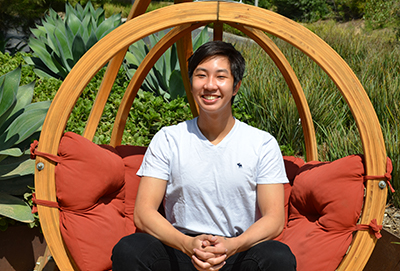
"I come from a non-traditional STEM background," says SIRiPods student James Hort, who found the pilot program "really positive."
“I come from a non-traditional STEM background,” says James Hort, chemical engineering student in Pod 2 with Olivares Martinez. “My dad is a construction worker and my mom is an accountant. It’s hard for me to find a mentor and a way into research.”
Hort’s favorite part of the program has been the career talks and meeting with different professors. “I feel like the seminars in the morning really helped broaden my research view,” he says. “They introduced me to a lot of topics that haven’t been on my radar. It’s already helped me. I’ve developed presenting skills, how to do literature searches and reviews, and insights on Overleaf/LaTeX (a writing and editing program for scientific publishing). Overall, having the connections, like having the professors offer me a lab position and career advice, is really helpful. It’s been really positive.”
For UCI engineering undergraduate students, as Dylan would say, “The times, they are a-changin’.”
– Tonya Becerra
